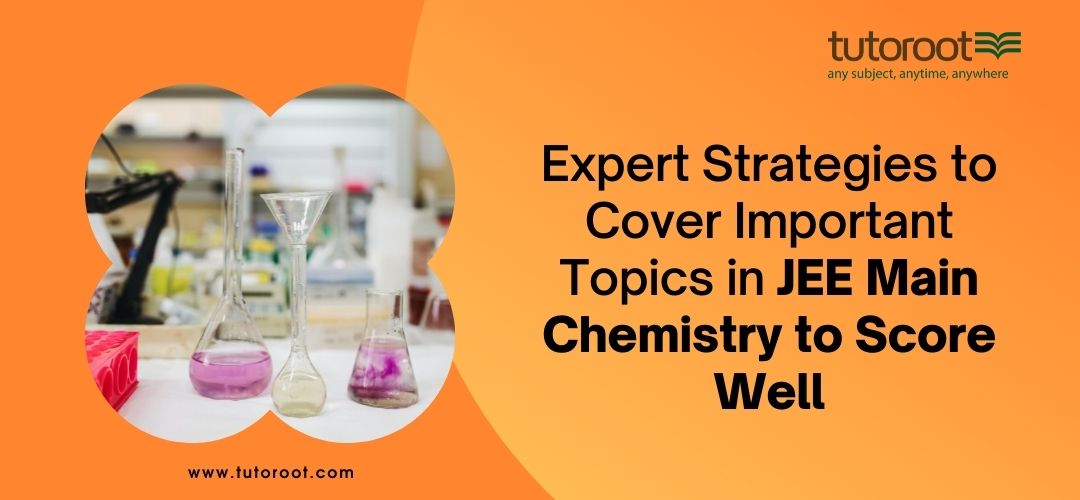Expert Strategies to Cover Important Topics in JEE Main Chemistry to Score Well
Many JEE aspirants overlook chemistry because they assume it is “quite simple” than math and Physics. This is. However, poor practice may cost students their JEE scores. You must focus equally on all three courses to achieve a good JEE rank. You will discover how to deal with tricky situations in JEE Chemistry in this essay.
Taking Care of Difficult Organic Chemistry Subjects Use credible books to learn from
Students sometimes misinterpret organic chemistry as demanding reaction memorisation, and as a result, many students dislike it. However, this is not the case. Organic chemistry is a rational subject that does not necessitate memorisation by rote. If you read a decent book on the subject, you will begin to enjoy it if you haven’t already.
In Organic Chemistry, the importance of named reactions cannot be emphasised. JEE asks several questions about identified reactions every year. The “Friedel-Crafts reaction,” “Reimer-Tiemann reaction,” “Wurtz reaction,” and “Cannizzaro reaction,” among others, are named reactions. These reactions should be second nature to you.
While studying each of the given processes, pay attention to characteristics such as reactants, products, electrophiles, nucleophiles, catalysts, reaction exceptions, favourable reaction conditions, negative reaction conditions, and reaction mechanism. Any of these can be the subject of a JEE question.
Make a list of all the reactions in a notebook
- Make a separate notebook to keep track of all the reactions you come across in Organic Chemistry.
- Make an effort to understand why each of these reactions is occurring.
- Go through this notebook every day and try to recall the process of any responses you see.
Over time, you’ll discover that you’ve grown highly familiar with Organic Chemistry reaction mechanisms, and you’ll start to appreciate it.
Challenging Topics in Inorganic Chemistry
All processes in inorganic chemistry must be grasped up. Although some inorganic reactions have mechanisms that may be understood, much of Inorganic Chemistry is memorised. Studying from a good book is essential since it provides clear explanations.
For JEE Inorganic Chemistry
OP Tandon’s Textbook of Inorganic Chemistry for Competitions (JEE Main & JEE Advanced) is a great book. It will assist you in better comprehending the subject. The JEE chemistry paper setters must cover some topics in inorganic chemistry. They include metallurgy, coordination compounds, p-block elements, and other disciplines. These issues should be thoroughly investigated.
Solve all of the questions from the previous year on the same subject. This will give you an overview of the types of questions you’ll encounter in JEE.
Make a concerted attempt to link objects to the periodic table: Examine the patterns (such as salt solubility) and link them to the periodic table. You will almost always find a direct relationship, except for a few exceptions.
Trend analysis will also help you remember features of various elements and compounds, which will come in handy in later chapters. For example, suppose you’ve studied trend analysis and are familiar with salt solubility. In that case, you’ll have no issue remembering whether or not a particular salt is soluble while studying the Qualitative Analysis chapter.
Make a journal of your reactions
- Make a notebook for inorganic chemistry the same way you did for organic chemistry.
- Make a list of all of the critical responses in that notebook.
- Regularly, look over this notepad.
Around three months before the exam, begin daily revisions from this notebook.
Make a note of any exceptions that need to be recalled in the same notebook. Remembering exceptions is equally as important as remembering equations in inorganic chemistry.
4 Important tips need to follow while doing final revision
- Qualitative analysis is the most dreaded topic in JEE Inorganic Chemistry. The colours of the compounds are difficult to recall. It will be easier to write the compounds’ names in the same colour ink as the compounds’ colour. This can help you establish a picture memory of the colours of combinations, making it easier to remember them.
- Complex Topics in Physical Chemistry: Concentrate on a single topic. Don’t try to memorise formulae mindlessly. Make an effort to understand things logically. Physical chemistry necessitates a logical understanding of all concepts since it involves addressing numerical issues.
- Examine JEE questions from previous years: Solving last year JEE issues can provide you with a better grasp of the types of questions you’ll be asked, as well as confidence as you approach them.
- Use the mole concept to help you understand things: In physical chemistry, the concept of a molecule is the most fundamental. On the other hand, its use can be found in several places. For a crystal-clear understanding of subjects like Chemical equilibrium, Chemical kinetics, Electrochemistry, and so on, everything should be conceived of in terms of moles and equivalents.
Conclusion
In this post, you learned how to deal with difficult JEE chemical issues. Make the most of these strategies to succeed in JEE chemistry. For any queries you can have a technical mentor from our team is ready assist you.

